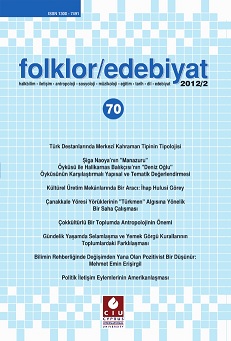Çanakkale Yöresi Yörüklerinin “Türkmen” Algısına Yönelik Bir Saha Çalışması
A Field Research on the Perception of the Yuruk in Çanakkale about the “Turkmen”
Author(s): Şeref Uluocak, Cumhur AslanSubject(s): Ethnohistory, Social history, Culture and social structure , Social differentiation, Sociology of Culture
Published by: Uluslararası Kıbrıs Üniversitesi
Keywords: Yuruk; Turkmen; Culture; Perception; Prejudice; Affinity; Differentiation;
Summary/Abstract: The conceptualizations of Yuruk and Turkmen hold a qualification that can be evaluated in the form of ‘integrations of collective identity patterns’ as ‘collective belonging forms’ in the most general sense. Collective belonging forms correspond to a socio-cultural construction format that the individuals acquire during ‘identification’ process at subjective level in objective social reality and that have operability practically and symbolically. In terms of pattern integrations in question, it seems possible for collective identity to be categorized as layers mediated by religious spiritual, denominational-social power relations, socio-cultural ethnicity, national references, gender roles and ‘other’ classification criteria that is possible to develop. On the basis of ‘affinity’ and ‘differentiation’ processes in terms of collective belonging references; ‘in-group’ and ‘off-group’ legitimization dynamics of individuals within the objective reality play role for integrations of collective identity pattern. In this study, conceptual indicator and the ways of social representations, which form the ‘perceptions’ of the Yuruk about the Turkmen, who ,from the same historical angle in terms of integrations of collective identity pattern, continued socio-cultural ethnicity, national belonging and a nomadic lifestyle for a long time in a similar way are emphasized. It is observed that communities in Çanakkale that define themselves as Tahtacı Turkmen resemble communities that call themselves ‘Yuruk’ in the point of ‘ Turkishness’ which forms the most dominant codes in terms of integrations of collective identity pattern and which play role as an integration of general super ordinate identity pattern in the evaluation aimed at in-group and off-group, yet within the framework of faith-religion integrations they contextually differ from these people who are Sunni-Muslim with Turkish-Turkmen distinction references.
Journal: Folklor/Edebiyat
- Issue Year: 18/2012
- Issue No: 70
- Page Range: 107-122
- Page Count: 16
- Language: Turkish

